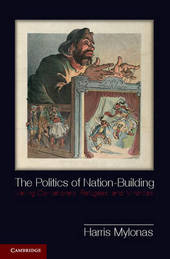
|
The Politics of Nation-Building: Making Co-Nationals, Refugees, and Minorities
Paperback / softback
Main Details
| Title |
The Politics of Nation-Building: Making Co-Nationals, Refugees, and Minorities
|
| Authors and Contributors |
By (author) Harris Mylonas
|
| Series | Problems of International Politics |
|---|
| Physical Properties |
| Format:Paperback / softback | | Pages:280 | | Dimensions(mm): Height 234,Width 155 |
|
| ISBN/Barcode |
9781107661998
|
| Classifications | Dewey:320.089 |
|---|
| Audience | | Professional & Vocational | |
|---|
| Illustrations |
20 Tables, unspecified; 11 Maps; 9 Halftones, unspecified; 11 Line drawings, unspecified
|
|
Publishing Details |
| Publisher |
Cambridge University Press
|
| Imprint |
Cambridge University Press
|
| Publication Date |
18 February 2013 |
| Publication Country |
United Kingdom
|
Description
What drives a state's choice to assimilate, accommodate or exclude ethnic groups within its territory? In this innovative work on the international politics of nation-building, Harris Mylonas argues that a state's nation-building policies toward non-core groups - individuals perceived as an ethnic group by the ruling elite of a state - are influenced by both its foreign policy goals and its relations with the external patrons of these groups. Through a detailed study of the Balkans, Mylonas shows that how a state treats a non-core group within its own borders is determined largely by whether the state's foreign policy is revisionist or cleaves to the international status quo, and whether it is allied or in rivalry with that group's external patrons. Mylonas injects international politics into the study of nation-building, building a bridge between international relations and the comparative politics of ethnicity and nationalism.
Author Biography
Harris Mylonas' research focuses on the processes of nation- and state-building, the politicization of cultural differences, immigration policy, and political development. He completed his Ph.D. at Yale University in 2008 and then joined the Political Science department at George Washington University as an Assistant Professor in the fall of 2009. He is also an Academy Scholar at the Harvard Academy for International and Area Studies where he conducted research during the 2008-9 and 2011-12 academic years. His work has been published in Security Studies, Comparative Political Studies, Ethnopolitics, the European Journal of Political Research, and various edited volumes. He has also published opinion pieces in international newspapers and magazines (Los Angeles Times, ForeignPolicy.com, CNN.com, Newsweek Japan, and the Hurriyet Daily News and Economic Review, among others). He is currently working on his second book project - tentatively entitled The Politics of Ethnic Return Migration - analyzing the policies that states develop either to attract and/or to incorporate people returning to their country of origin, allegiance, or citizenship.
Reviews'Mylonas deftly combines quantitative analysis of cross-national data with an in-depth study of policies toward non-core groups in Greek Macedonia and provides impressive evidence to support his theoretical propositions. Summing up: recommended. Graduate, research, and professional collections.' A. Paczynska, Choice 'Mylonas highlights a hitherto understudied aspect of minority policy making in the Balkans: whether newly nationalizing states tolerated, assimilated, or forcibly removed ethnic minorities from their territories crucially depended on whether or not these minorities were supported by other states and whether these other states were allies or enemies. Combining broad statistical analysis with detailed archival research, the book puts the international aspects of domestic nation-building into sharp relief.' Andreas Wimmer, Princeton University 'There is much to praise in this book. To begin with, Mylonas is one of those rare scholars who adopt a sophisticated positivist methodology that combines large analysis with a detailed knowledge of (some) historical cases obtained through patient archival research. Second, while much scholarship discusses two policy options (inclusion or exclusion), Mylonas interestingly broadens the analysis to include three policies - assimilation, accommodation and exclusion - producing, respectively, co-nationals, minorities and refugees. And, third, in an age of liberal interventionism Mylonas advances sober and thoughtful recommendations on how the international community may be able to diminish the recurrence of crimes of mass atrocity by intervening less, not more.' Roberto Belloni, Buchbesprechungen
|